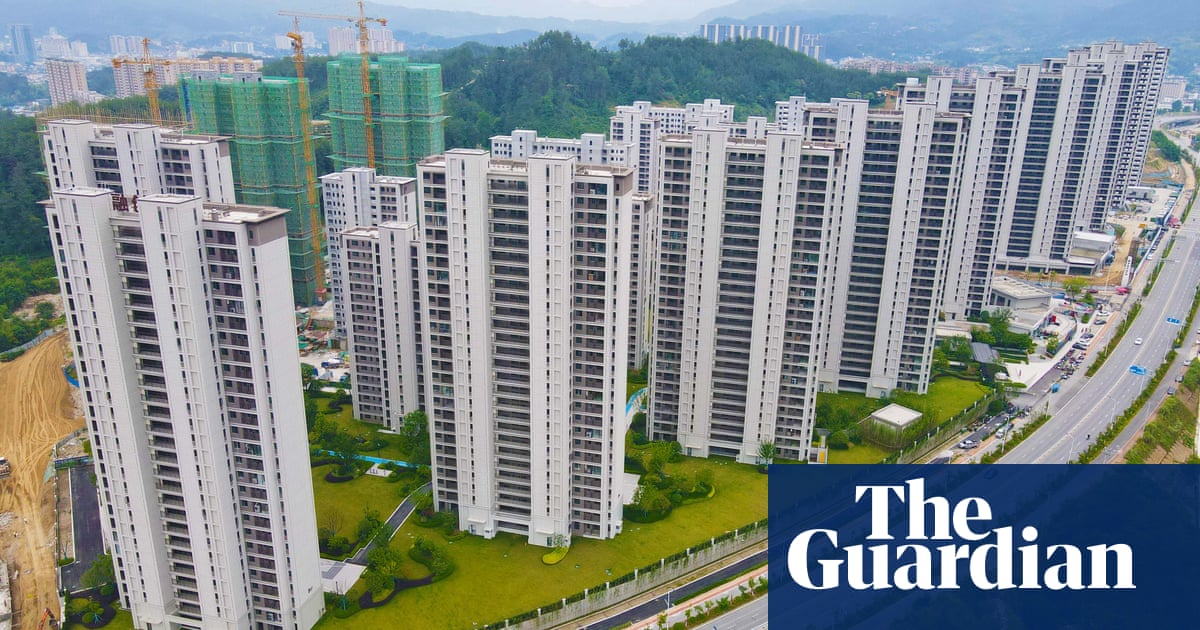- cross-posted to:
- [email protected]
- cross-posted to:
- [email protected]
The industry that has traditionally powered about a quarter of GDP has been in a downward spiral that policymakers have struggled to halt
All across China, from Beijing in the north, to Shenzhen in the south, millions of newly built homes stand empty and unwanted. There were nearly 391m sq metres of unsold residential property in China as of April, according to the National Bureau of Statistics. That is the equivalent of Manchester and Birmingham combined – and then some – sitting as vacant, unwanted property.
This glut of idle property has caused a headache for the government, shaken the world’s second largest economy and raised tensions over the purpose of housebuilding in a nation where property investment had been viewed as a safe bet.
Since the real estate sector was sent into a tailspin in 2020, caused by the pandemic and a sudden regulatory crackdown, the industry that has traditionally powered about one-quarter of GDP has been in a downward spiral that policymakers have struggled to halt.
The crux of the problem is that, with shaky faith in the economy and big property developers failing to deliver on paid-for apartments, potential homebuyers are keeping their money out of the market.



They are unwanted for the price that is wanted but for free I bet they could fill them up in a jiffy but that would make them dirty filthy communists and china don’t want that ??? /s
Ehhh, you would think that. However, China currently has more housing than people. I think at the moment the excess housing in the country could home an extra 150m people.
You can knock them for ignoring basic fundamental economic ideas like supply and demand, but it’s not like they have a large homeless population being unsheltered.
This is, again, just a plainly incorrect take. Basically everyone in China is housed, yes, but a vast proportion of them still live in rural villages. The rural-to-urban transition does need to be planned for, and it’s been a huge factor in China’s real estate market. China’s urbanization rate today is 66%, compared to 75% in Russia and 83% in the US.
I don’t really see how your rebuttal conflicts with what I said? Unless you are claiming that developers were building housing for an eventual urbanization project that’s going to migrate 150m people to cities within the next year or two…
These are still real estate companies we’re talking about. They aren’t wanting to be left holding the bag for years while their investment properties dry rot from prolonged vacancies.
Urbanization is expected to hit 75% by 2030… This is analysis corroborated by Morgan Stanley and others, so, unironically, yes.
That’s still a bit of a long time for developers to have their money wrapped up in empty apartment complexes. Large buildings like that can start having major issues after months of vacancies, let alone years.
I think it’s still more likely that developers’production exceeded immediate demand than it is for them to have planned for them to be vacant for years.
Either way, it’s still not an economically sound idea. I think if they had planned for this, it wouldn’t have hit the real estate market as hard as it has.
Basically, government officials knew that at some point they needed to aggressively overbuild real estate capacity in order to meet the urbanization demands. I think they predicted an incorrect curve: whereas they perhaps anticipated that urbanization would follow a trend more like Korea (74% at a similar stage in their urbanization trajectory), instead China is following a curve similar to Taiwan (~66%). A mistake in policy, yes, but it has localized effects.
Plus, I think you’re missing a far more essential point: China doesn’t give a fuck if every real estate developer goes bankrupt. That’s just a cost of doing business. Instead, China’s just swooping in and buying up distressed assets to turn into public housing. Homeowners aren’t left holding the bag: developers are.
Just because they operate a mixed economy doesn’t mean they can ignore material realities. Investments going unrealized arguably have more negative outcomes for more socialized markets.
You can’t wring blood from a stone. Its not like it’s just the developers cash being used to build the housing, there are subsidies and investments from banks, which are owned by the government. So if a project goes under, the best case scenario is that they buy it back to get some return on investment, but that’s still robbing peter to pay peter. It’s just not sustainable, especially if you aren’t making wind on your other plans like urbanization.
China has seen the hottest real estate market it’s ever seen. How many subsidies were banks handing out?
Does china house them or does china do something else with them?
Yes.
Well they could use them as makeshift landfills for their garbage EVs, but people cannot live in them as there is no water, gas or electicity anywhere. And that’s only half the problem because there are far more empty shells for an excuse of a home than there are people to populate them. It’s one giant ponzi scheme that got completely out of hand over a decade ago and the government struggles a lot to restrain and keep it going at the same time so it doesn’t collapse.
yeah it is funny that an article talking about empty, unwanted units also talks about not delivering for poeple that bought them. Its a wierd situation.